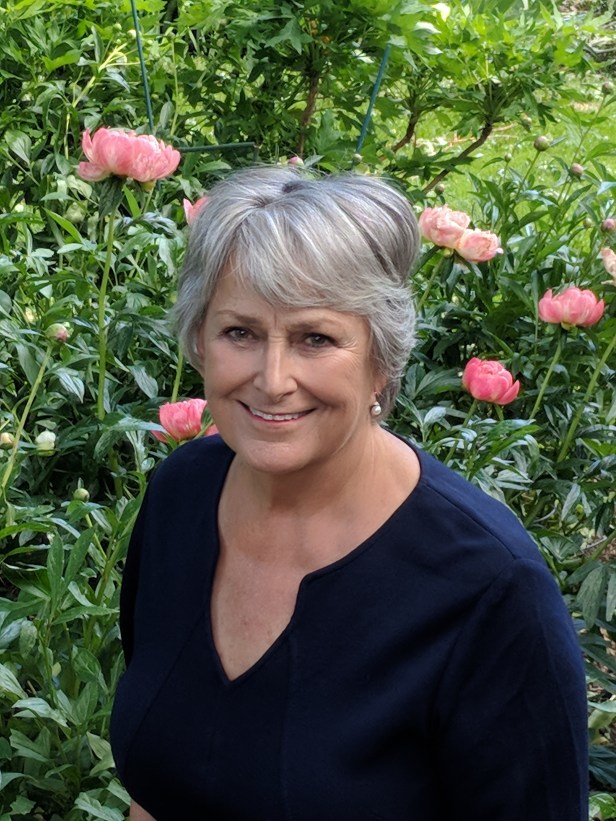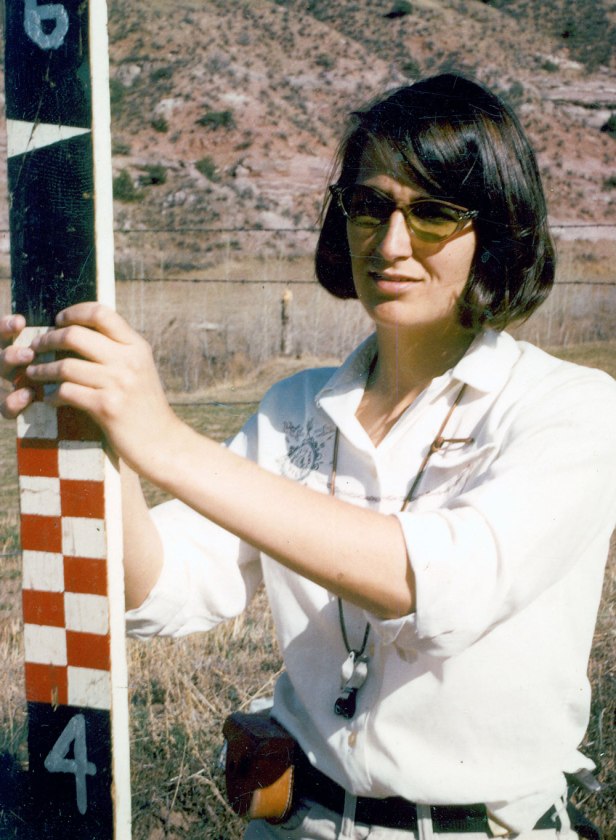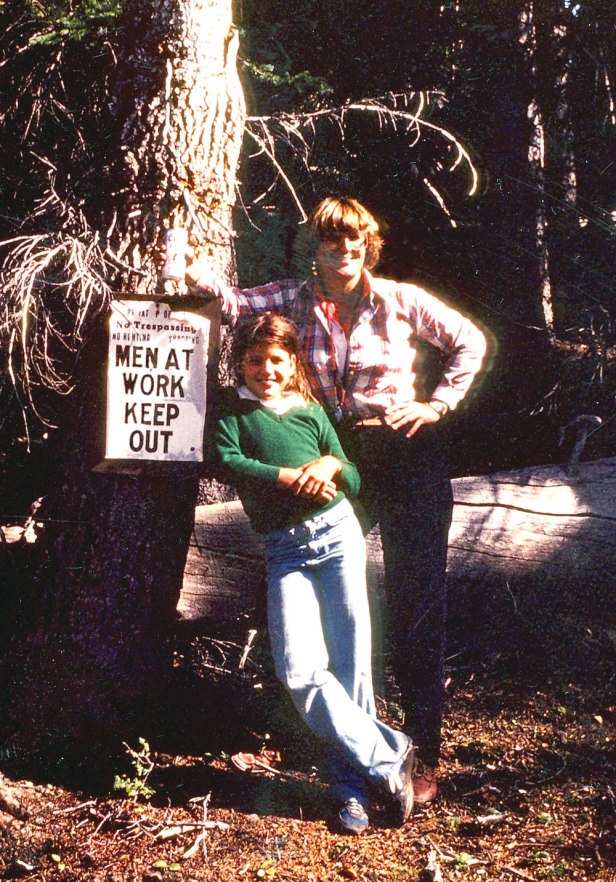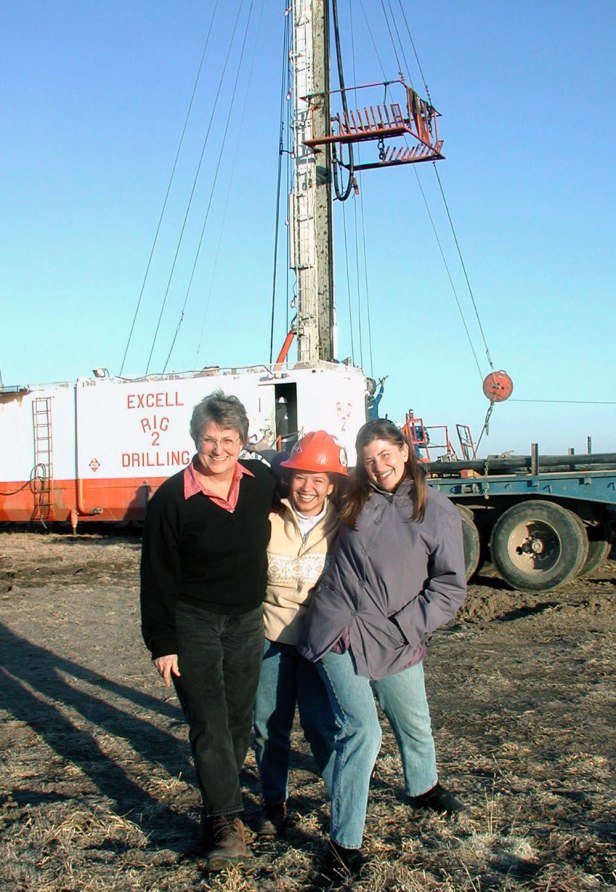By Sarah Derouin
Petroleum geologist Robbie Gries has always been fascinated with rocks. “As a child, I just loved when I would see a rock, because you never saw them unless you left the Gulf Coast,” Gries says. “Rocks were really unique things,” where she grew up, she says, adding that they had to drive more than an hour inland to see outcrops. Despite her appreciation of a good agglomeration of minerals, Gries says she hadn’t really heard of geology until she was a sophomore at Del Mar Junior College in Corpus Christi, Texas.

She took a geology class after hearing the professor was good — he was indeed good and Gries says she became “totally hooked” on geology. The professor encouraged her to continue studying it, and offered a scholarship to finish her four-year degree. She changed her major and headed off to Colorado State University in Fort Collins, where, in 1966, she became the first woman to graduate from the university with a degree in geology. She later completed a master’s degree at the University of Texas at Austin, then moved to Kansas with her husband and daughter to teach. Eventually, she made her way into the field of petroleum geology, where she has thrived ever since.
Gries was also one of the first women to join the Denver Petroleum Club. In 2001, she became the first woman to be president of the American Association of Petroleum Geologists (AAPG), and she was the first woman to receive the association’s Michel T. Halbouty Award for Outstanding Leadership in 2012. She says these things happened, not because she wanted to be the first, but as “a byproduct of following my heart … I was just doing things that I wanted to do because I found them interesting or fascinating, or because I was willing to take on the challenge.” She has continued to be a leader in the geologic field and is currently the 2018–2019 President of the Geological Society of America.
I talked with Gries about her journey in petroleum geology, what it takes to run your own business, and capturing the stories of 100 years of women in the field.
SD: Did you always have an interest in petroleum geology?
RG: No, not at all. My interest was in teaching. When I was in the first grade, I wanted to teach first grade, and when I was in the sixth grade, I wanted to teach sixth grade, and when I was a senior … [laughs]. That’s just the way it was.
With my master’s, I did some night-school teaching at Wichita State University in Kansas, and I loved it. I always liked teaching, but I hated the bureaucracy around professors and what we had to do with scoring, books, field trips and everything else. It was just so rigidly controlled. I felt like I didn’t have any freedom to design my own path and course. And I thought, I’m not sure I have the personality to be dictated to in an academic setting.
I think [staying out of academia] was a wise decision. For the rest of my life, when I would judge my character against the requirements of a job, it influenced the directions I went in. At the end of a couple of years in Kansas, my husband and I separated and divorced, and I was armed with only a master’s degree. I didn’t want to look at teaching jobs and I had to have a job, so I started looking at oil and gas companies.

SD: How did you transition into petroleum geology?
RG: Well, this is where luck comes in: This was 1973, and that’s when oil companies were forced to adopt affirmative action plans for their companies. I was looking for a job and some companies in Denver were needing to fill their quota of women. Texaco needed one more woman to fill their quota. I got the job and never left Denver.
Over the years that I worked in petroleum, I was just shocked to find that you do so much research and you have so much permission to explore new ideas and new scenarios in structural geology, geochemistry, stratigraphy … a lot of the really big breakthroughs that came in these fields came out of the oil and gas industry.
I was pleasantly surprised at the fact that I could do innovative thinking and put out ideas to publish. A career in petroleum geology really satisfied all of my needs because, as a petroleum geologist, you also do a lot of mentoring of new hires just out of school. The staff has to teach and mentor, which fulfilled the desire I had for teaching. I also would go around the country or the world giving different talks — the opportunity to do that at universities and schools was great. I ended up getting everything I ever wanted.

SD: I read that your nickname at Texaco was “token.” Is that true?
RG: Oh, yeah. For me, it was funny, you know? I was raised in a family where a sense of humor was very much a part of our everyday life. And it’s always been one of my personal advantages that I have been able, for the most part, to discern when someone is using humor in a good way versus someone using humor in a derisive way. My boss at the time picked the word “token” to describe me. I recognized that he was using humor to get the whole staff over the fact that I was hired to fulfill a quota.
SD: In 1995, you started your own petroleum exploration/production company. What advice would you give to someone who was interested in taking a science-entrepreneurial path?
RG: As you’re working for a company, I think you need to always be thinking about what you would do if this company weren’t around anymore. You need to ask yourself, “What areas am I best in?” You need to develop your science skills to the point where you are an expert in certain areas, and use your assets the best that you possibly can.
I worked in a lot of basins and plays — every basin is different, and every play is different. I got very comfortable with certain areas where I knew as much as anybody about what approaches work in that basin. When you have a roster of places where you know you can work, you have a basket of possibilities if you’re ever on your own developing and selling prospects or forming a company and getting financial backing.
SD: What would you say that your strengths are as a geologist and business owner?
RG: One of my strengths is in viewing geology from different perspectives, looking at the dogma or established ideas about a particular area, and being willing to sometimes challenge the dogma with a whole new theory — to look at something in a way nobody else had. I think that has applied for most of my career, and yet, most of my company’s success has been based on taking producing properties that are fairly easy to work and don’t require a lot of creative thinking. Luckily, I was able to do both. If you are strictly going out for the wild and crazy wildcat plays, you might drill a lot of those and never have success. You might not ever find that big one, but if you have a backup of a proven production, then you can fall back on that. What’s made my life fun is looking at creative new ideas and applying them, but what’s made it profitable has been falling back on a proved production.

SD: Where do you see the next frontier in petroleum geology?
RG: I’m fascinated by gas hydrates on the seafloor and wondering what they might bring us. They will provide a lot of natural gas if we can ever figure out how to mine them. That’s brand-new science that’s really in its beginning stages. I think if you’re looking for a long-term career in this business, you have to look at the transitioning away from oil and more toward natural gas because natural gas is a more environmentally friendly fuel than coal or oil.
SD: What inspired your recent book, “Anomalies: Pioneering Women in Petroleum Geology”?
RG: In 1991, Doris Malkin Curtis died. She was a real pioneer in petroleum geology, and I regretted that I hadn’t captured her stories. As a result of that, I said to some of my women friends, “We’ve got to collect our stories before we die.” I had in my mind that someday I would [write a book]. When AAPG was getting ready to celebrate its 100th anniversary, I suggested to our women’s-interest group that we do some research and find out who the first women in petroleum were.
Well, this led us to find this rich trove of applications from women seeking to join AAPG through the years. AAPG had kept all these membership applications on index cards in the basement of its building in Tulsa, Oklahoma. For each one of these cards we pulled out with a woman’s name on it, we did research to find out what happened to that woman. There was a plethora of great stories and interest. I thought our history would be very recent, but we found that women’s history in petroleum was almost as old as the men’s! And it was certainly as old as the AAPG. The first woman we researched had been hired in the petroleum industry in 1917, the same year AAPG was founded. No one knew we had that long of a history, and that was a discovery that just rocked our socks. That’s what inspired me to finally do the book.
Sarah Derouin is the 2018–2019 GSA Science Communication Fellow and a freelance science writer based in San Jose, Calif. She holds a doctorate in glacial geology from the University of Cincinnati and worked for the Bureau of Reclamation in seismic hazards and geomorphology. She is a graduate of the science communication program at the University of California–Santa Cruz.
Published with special thanks to EARTH magazine.
###